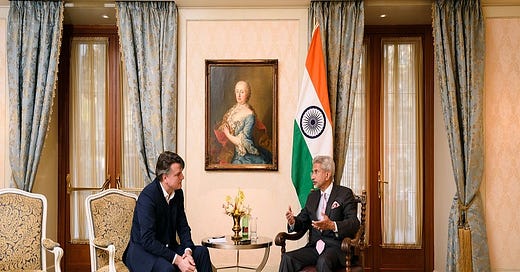India’s Top Diplomat Shared Some “Politically Inconvenient” Truths During His European Trip
The “politically inconvenient” truths that Indian External Affairs Minister Dr. Subrahmanyam Jaishankar shared during the final leg of his European trip should be deeply reflected upon by all observers, especially those Western ones who remain in denial about the global systemic transition and India’s role within it. Bi-multipolarity is over and Indian-driven tripolarity is rapidly replacing it prior to the inevitable onset of complex multipolarity (multiplexity), which will likely happen a lot quicker than most Westerners expect.
Indian External Affairs Minister (EAM) Dr. Subrahmanyam Jaishankar gave an interview to Austria’s Die Presse during the last leg of his European trip where he shared some “politically inconvenient” truths that this de facto New Cold War bloc needed to hear. His full insight is paywalled, but readers can get a general idea of it via these two reports. The present piece draws attention to the EAM’s top quotes, each of which are also analyzed in the context of the global systemic transition to multiplexity.
----------
* “When Europe reduces its imports from Russia, it has to go to other oil markets. And those markets have been our main sources. If you take away my food, what am I going to do? Starve.”
- India’s traditional oil suppliers in West Asia might jack their prices to exploit the unexpected surge in European demand, hence why Delhi prefers purchasing discounted resources from Moscow.
* “There are also incidents in Asia, where countries in Europe or Latin America do not feel the need to take a position. What happened in Ukraine is closer to Europe.”
- Just like Europe remains neutral towards a lot of what happens in Asia, so too does India have the right to remain neutral towards the Ukrainian Conflict.
* “Europe has a different history with Russia than India. We also have different interests in Ukraine than you do. Almost all states will say that they support the principles of the UN Charter. But look at the world of the last 75 years: Have all UN members really always followed the UN Charter and never sent troops to another country?”
- The so-called “rules-based order” at its most basic as enshrined in the UN Charter was never perfectly respected as proven by the continued prevalence of international conflicts in the over seven-and-a-half decades since that document’s promulgation. It’s therefore hypocritical for Westerners to pretend that this was never the case when pressuring others to abide by their unilateral sanctions against Russia.
* “The more India grows, the greater our economic weight and political influence become, and the better it is not only for us but also for the world. Not only the world order but also Asia must become multipolar.”
- India is confident with its newfound role as a globally significant Great Power, which is objectively in the interests of all responsible members of the international community. By pioneering the global systemic transition in the way that it has, India is guaranteeing a multipolar order in Asia and the world.
* “No region will be stable if it is dominated by a single power. The essence of international relations is for states to get along and find a balance.”
- The Sino-American bi-multipolar superpower duopoly that previously characterized International Relations was inherently unstable, but India’s astronomical rise over the past year is restoring balance.
* “For many African countries, the fertilizer issue is a top priority. If there is not enough fertilizer coming from Russia and Ukraine, there will be global food shortages and famine in a few months or years.”
- India won’t directly say so due to its pragmatic policy of principled neutrality, but its top diplomat is tacitly extending credence to the view that the Golden Billion’s sanctions catalyzed the food crisis.
* “[The oil price cap] was a Western decision without consultations with us. Every state has the right to make decisions. But we will never automatically sign what others have cooked up.”
- India is sovereign enough of a state that it’ll never unilaterally concede on its objective national interests, let alone under foreign pressure, hence why it proudly defied the West’s oil price cap.
* “Russia has always had a European-Asian duality. But this two-headed eagle always looked more toward Europe than toward Asia. Russians always saw themselves as Europeans. In the wake of the conflict, that orientation could shift to Asia. This has geopolitical implications.”
- There’s no doubt that one of the greatest geopolitical consequences of Russia’s special operation was that this newly restored world power decisively pivoted to the Global South in general and towards India in particular, with which it envisages creating a third pole of influence alongside Iran.
----------
The abovementioned collection of “politically inconvenient” truths that India’s top diplomat shared during the final leg of his European trip should be deeply reflected upon by all observers, especially those Western ones who remain in denial about the global systemic transition and India’s role within it. Bi-multipolarity is over and Indian-driven tripolarity is rapidly replacing it prior to the inevitable onset of complex multipolarity (multiplexity), which will likely happen a lot quicker than most Westerners expect.




